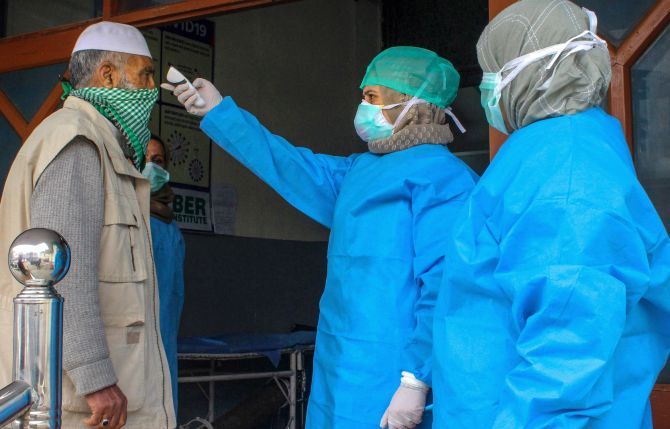Asserting that the ongoing lockdown has helped minimise the spread of coronavirus, the government on Thursday said the recovery rate among COVID-19 patients has almost doubled in last the ten days
but testing needs to be ramped up continuously for a decisive battle against the pandemic. The nationwide tally, meanwhile, rose to 21,700 cases and 686 deaths.

As the nationwide lockdown entered its 30th day, concerns over its economic cost also escalated with the apex industry body Confederation of Indian Industry forecasting a 0.9 per cent decline in the GDP in the case of a prolonged lockdown and a best case scenario of 1.5 per cent growth for the current fiscal. Global rating agency Fitch also slashed its FY20-21 GDP growth estimate for the country to 0.8 per cent.
A high-level group of top bureaucrats, comprising of Union Home Secretary and his counterpart in the Department for Promotion of Industry and Industry Trade, reviewed measures to speed up economic and industrial activities and held a video conference with representatives of industry associations.
In its evening 5 pm update, the Union health ministry put the total number of confirmed infections across the country at 21,700 with at least 686 deaths. It also said that at least 4,324 COVID-19 patients have been cured and discharged. More than five lakh tests have been conducted so far.
Maharashtra alone has reported more than 5,600 cases and at least 269 deaths, while Gujarat has seen over 2,400 confirmed infections with over 100 deaths and Delhi has more than 2,200 cases with 48 deaths. Madhya Pradesh, Rajasthan, Uttar Pradesh and Tamil Nadu have also reported large number of cases.
The rate of recovery has improved to 19.89 per cent, from 9.99 per cent ten days ago on April 14, while 12 districts have reported not a single case in the last 28 days, health ministry joint secretary Lav Agarwal said. The number of districts with no cases in last 14 days has also increased to 78.
Government officials said it has been able to "cut coronavirus transmission", minimise its spread and increase the doubling time of COVID-19 cases in the country during the 30-day period of the nationwide lockdown.
While asserting that the growth of coronavirus cases in the country has been more or less linear and not exponential, it also said testing has been ramped up consistently.
Addressing a daily press conference on the COVID-19 situation in the country, C K Mishra, the chairman of Empowered Group Two, said testing has been a "crucial weapon" during the 30 day lockdown period, which began on March 24, to ascertain if one has contracted the disease or not.
As on March 23, nearly 15,000 tests were done across the country and by April 22 more than 5 lakh tests were conducted, which is about "33 times in 30 days", he said, adding, "But we are conscious of the fact that this is not enough and we have to continuously ramp up testing in the country and we will do that."
Of the empowered groups formed to suggest measures to ramp up healthcare, put the economy back on track and reduce misery of people once the lockdown is lifted, Mishra is the chairman of Empowered Group Two tasked with coordinating availability of hospitals, isolation and quarantine facilities, disease surveillance, testing and critical care training.
"The growth of COVID-19 cases has been more or less linear, not exponential; this indicates that the strategies we adopted have succeeded in containing the infection to a particular level. Post imposition of lockdown, while the number of new positive cases has increased by 16 times, testing increased by 24 times," Mishra said.
"Despite a 24-fold increase in testing, percentage of positive cases is not rising. The percentage of positive cases as a ratio of testing is more or less the same as that a month ago," he said.
Mishra also claimed that India has done better than a majority of developed countries with respect to the percentage of test cases yielding positive results. He said South Korea is among the countries that have done better than India.
"We need to evolve our strategy based on the current position... We seem to be doing well so far with our strategy which is intensely focused on areas where we see a lot of positivity and action happening. Our testing strategy has been focused, targeted and continues to expand," he said.
Home Ministry Joint Secretary Punya Salila Srivastava said feedback is being taken from industrial units and their problems are being addressed. She said certain quarters of the industry and exporters have raised concerns over some new guidelines, saying it was difficult for them to implement those for partial resumption of their factory operations.
Srivastava said progress in economic activities, especially in rural areas, is being witnessed, and added that road construction, brick kilns and cement manufacturing related works have also started.
In another significant decision, the government froze inflation-linked allowance for its 1.1 crore employees and pensioners, a move states are likely to replicate, helping save a combined Rs 1.2 lakh crore that could be used to combat the coronavirus crisis.
Industry body CII said India's GDP, in the baseline scenario, is expected to grow at just 0.6 per cent on an annual basis as economic activity is expected to remain constrained due to continuing restrictions on the free movement of goods and people beyond the lockdown period.
In the most optimistic scenario, which envisages a faster pick-up in the aftermath of the lockdown, the GDP is forecast to register a growth of 1.5 per cent.
In case of a more prolonged outbreak, where the restrictions in existing hot-spot regions get extended, while new regions are identified as 'hot-spots' leading to intermittent stop and start in economic activity, the GDP is likely to decline by 0.9 per cent, it added.
Separately, Fitch Ratings also slashed India's growth projection to 0.8 per cent for 2020-21, saying that an unparalleled global recession was underway due to disruptions caused by the coronavirus pandemic and resultant lockdowns.
The stock market and the rupee, however, recorded gains for the day as hopes of another stimulus package from the government bolstered investor sentiments.
The Congress's highest decision making body, the Congress Working Committee, demanded that the remaining period of lockdown should be used to prepare and publish a detailed 'exit strategy' and a comprehensive 'road map' for the future.
In its resolution, the CWC also said the virus does not discriminate on the basis of caste, creed, religion or gender and as a nation, we must be wary of forces that seek to polarise in times of crisis such as these.
Minority Affairs Minister Mukhtar Abbas Naqvi said the entire Muslim community cannot be held responsible for one group's "crime", reacting to instances of Muslims being blamed for the spurt in COVID-19 cases after Tablighi Jamaat congregation in the nation's capital. He also expressed confidence that Muslims will abide by lockdown guidelines during the holy month of Ramzan.
Congress president Sonia Gandhi accused the BJP of spreading the virus of communal prejudice and hatred in the country, asserting that "grave damage" is being done to social harmony.
Rahul Gandhi said issues of migrant workers must be addressed as the first priority and lockdown beyond May 3 should only be continued in COVID-19 hotspots and not in green zones, while his sister and Congress general secretary Priyanka Gandhi Vadra demanded that migrant workers stuck at various state borders due to the lockdown be permitted to return to their native places after due testing and precautions.
Separately, Maharashtra Deputy Chief Minister Ajit Pawar also urged Railway Minister Piyush Goyal to run special train services from Mumbai and Pune to ferry migrant workers stuck in Maharashtra to their native states after the lockdown ends on May 3.
Chief ministers of Congress-ruled states, on the other hand, hit out at the central government for not providing financial assistance to them, asking how will the country win the battle against COVID-19 in this time of crisis.











 © 2025
© 2025